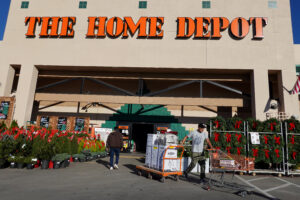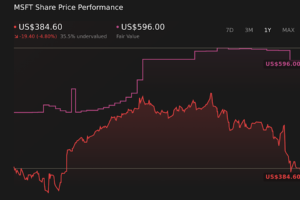<p class="canvas-atom canvas-text Mb(1.0em) Mb(0)–sm Mt(0.8em)–sm" type="text" content="Regulatory scrutiny of the biggest tech giants has been rapidly intensifying in recent months, as concerns about market power and potentially anticompetitive business practices continue to mount. Politicians are calling for many companies to be broken up, believing such drastic moves would bolster competition and ultimately benefit consumers. Recently, the Federal Trade Commission has taken the lead in scrutinizing Amazon.com (NASDAQ: AMZN) for potential antitrust violations, shortly after the FTC scored a monumental victory over Qualcomm.” data-reactid=”11″>Regulatory scrutiny of the biggest tech giants has been rapidly intensifying in recent months, as concerns about market power and potentially anticompetitive business practices continue to mount. Politicians are calling for many companies to be broken up, believing such drastic moves would bolster competition and ultimately benefit consumers. Recently, the Federal Trade Commission has taken the lead in scrutinizing Amazon.com (NASDAQ: AMZN) for potential antitrust violations, shortly after the FTC scored a monumental victory over Qualcomm.
<p class="canvas-atom canvas-text Mb(1.0em) Mb(0)–sm Mt(0.8em)–sm" type="text" content="Here are three parts of Amazon's business that regulators are taking a closer look at, according to Vox.” data-reactid=”12″>Here are three parts of Amazon’s business that regulators are taking a closer look at, according to Vox.


Image source: Amazon.
1. Fulfillment by Amazon pricing
<p class="canvas-atom canvas-text Mb(1.0em) Mb(0)–sm Mt(0.8em)–sm" type="text" content="Fulfillment by Amazon (FBA) is one of Amazon's most successful programs, and a critical component of funding Prime shipping costs. Sellers that participate in FBA pay a wide range of fees from inventory storage to packing orders to shipping and handling to returns — in essence, Amazon handles all aspects of fulfilling customer orders.” data-reactid=”26″>Fulfillment by Amazon (FBA) is one of Amazon’s most successful programs, and a critical component of funding Prime shipping costs. Sellers that participate in FBA pay a wide range of fees from inventory storage to packing orders to shipping and handling to returns — in essence, Amazon handles all aspects of fulfilling customer orders.
What’s less commonly known is that FBA extends to other third-party e-commerce platforms. Amazon will even handle merchant orders that are placed on competing sites as part of its Multi-Channel Fulfillment (MCF) offering. The issue is that FBA fees for fulfilling orders on third-party sites are in some cases much higher than FBA fees on Amazon’s platform.
Amazon lists several examples of products and their associated fees on its site. MCF has different pricing tiers based on shipping times, and expedited is comparable to Prime’s free two-day shipping.
|
Item |
FBA (Prime) |
MCF (Expedited) |
Difference (%) |
|---|---|---|---|
|
T-shirt |
$3.68 per unit |
$8.30 per unit |
126% |
|
Baby cot |
$10.92 per unit |
$16.42 per unit |
50% |
|
Computer monitor |
$75.78 per unit |
$78.30 per unit |
3% |
Data source: Amazon.
The difference can vary wildly depending on the item, but in some cases it’s quite extreme.
2. Competing on its own platform
Amazon has been getting criticized for competing on its own platform. The e-commerce giant continues to launch a growing number of private-label brands, which now total around 120. The conflict of interest is particularly fraught when you consider the company’s booming advertising business; Amazon was recently caught heavily promoting its own offerings in product searches and subsequently scaled back its ads following criticism.
“Third-party sellers are kicking our first party butt. Badly,” CEO Jeff Bezos wrote in his most recent annual shareholder letter. Bezos even provided data to back it up, showing that third-party sales represented 58% of physical gross merchandise sales last year. That’s despite Amazon’s first-party sales growing from $1.6 billion in 1999 to $117 billion in 2018.


Data source: Amazon. Chart by author.
Still, competing against its own merchants is a conflict of interest, and the FTC is particularly concerned whether Amazon is leveraging its access to third-party sales data to guide its own strategic and first-party product decisions, according to the report.
3. Prime bundling may be too powerful
<p class="canvas-atom canvas-text Mb(1.0em) Mb(0)–sm Mt(0.8em)–sm" type="text" content="Over the years, Amazon has continued stuffing more and more benefits into its wildly popular Prime membership program, which costs $120 per year and now includes video streaming, music streaming, discounts at Whole Foods, early access to Lightning deals, cloud photo storage, two-day shipping, and more. The company confirmed last year that it topped 100 million Prime members worldwide.” data-reactid=”54″>Over the years, Amazon has continued stuffing more and more benefits into its wildly popular Prime membership program, which costs $120 per year and now includes video streaming, music streaming, discounts at Whole Foods, early access to Lightning deals, cloud photo storage, two-day shipping, and more. The company confirmed last year that it topped 100 million Prime members worldwide.
Competing with Prime in any of the myriad areas where it offers benefits is a daunting proposition, particularly for companies that are trying to profit on a single service. Amazon has a unique willingness to forego profits nearly indefinitely, and Prime might potentially let it undercut rivals in ways that undermine competition.
It’s unclear if the FTC has actually launched a formal investigation, but the agency is definitely starting to ask questions.
<p class="canvas-atom canvas-text Mb(1.0em) Mb(0)–sm Mt(0.8em)–sm" type="text" content=" More From The Motley Fool ” data-reactid=”57″> More From The Motley Fool
<p class="canvas-atom canvas-text Mb(1.0em) Mb(0)–sm Mt(0.8em)–sm" type="text" content="John Mackey, CEO of Whole Foods Market, an Amazon subsidiary, is a member of The Motley Fool’s board of directors. Evan Niu, CFA owns shares of Amazon. The Motley Fool owns shares of and recommends Amazon. The Motley Fool has a disclosure policy.” data-reactid=”65″>John Mackey, CEO of Whole Foods Market, an Amazon subsidiary, is a member of The Motley Fool’s board of directors. Evan Niu, CFA owns shares of Amazon. The Motley Fool owns shares of and recommends Amazon. The Motley Fool has a disclosure policy.






